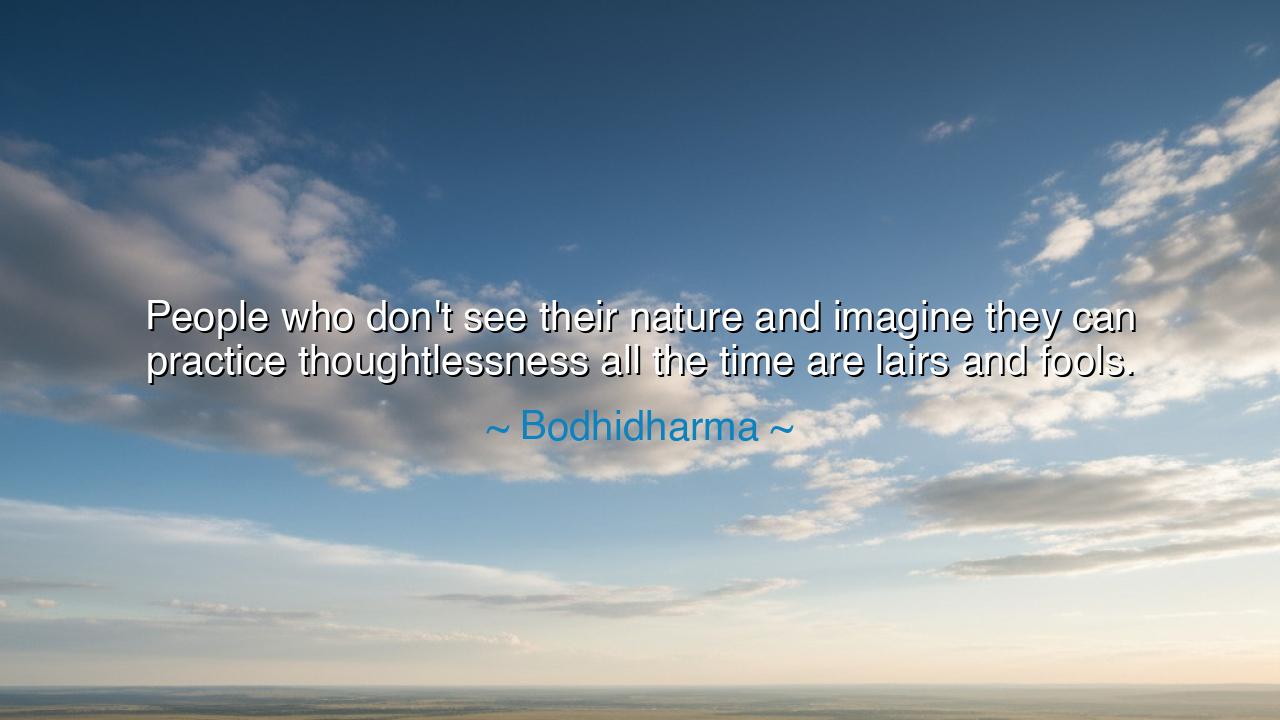
People who don't see their nature and imagine they can practice
People who don't see their nature and imagine they can practice thoughtlessness all the time are lairs and fools.






“People who don’t see their nature and imagine they can practice thoughtlessness all the time are liars and fools.” Thus spoke Bodhidharma, the great sage who carried the flame of Zen from India to China, whose words burn still like a lantern in the caverns of the mind. In this teaching, Bodhidharma warns against the illusion of false enlightenment — the arrogance of those who claim to have transcended thought while still blind to their true nature. His voice pierces through the centuries, reminding all seekers that awakening is not the escape from thought, but the awakening within it — the seeing of one’s self as it truly is, uncolored by delusion.
To understand his meaning, we must first know the origin of the master’s path. Bodhidharma was the patriarch who brought the Dhyana, or meditation school, from India into the heart of China. In a land already rich with philosophy and ritual, he offered a different way — not a way of words, but of direct insight. “See your nature, and you become Buddha,” he said. But to see one’s nature is not easy. It is not done by retreating from the world or by forcing the mind into emptiness. Many, mistaking Zen for silence, sought to annihilate thought, to “practice thoughtlessness,” as if enlightenment were a kind of blankness. Yet Bodhidharma called them liars and fools, for in denying their human nature, they denied the very path to truth.
What, then, is “seeing one’s nature”? It is to look inward with eyes that no longer deceive. It is to perceive the self not as the mind invents it — bound by pride, fear, or longing — but as it truly is: infinite, luminous, and beyond the play of form and thought. The Buddha-nature dwells not in escape from life, but in the full realization of it. When one truly knows oneself, one is no longer carried away by the noise of thought. Yet until that awakening occurs, to pretend at thoughtlessness is only self-deception — the same as painting calm waters over a raging sea. The fool calls it stillness; the wise call it illusion.
Consider the story of a monk who once came to Huineng, a later master in the Zen lineage, boasting of his meditation. “I have emptied my mind completely,” he said proudly. Huineng replied, “Then who is it that you have emptied?” In that question lay the whole of Bodhidharma’s teaching. The monk had confused the absence of thought with enlightenment, but emptiness without understanding is still ignorance. To see one’s true nature is not to erase the mind, but to awaken within it — to let thought come and go like clouds while the vast sky of awareness remains untouched.
Bodhidharma’s wisdom also warns against spiritual vanity — the belief that enlightenment can be performed like an act or sustained like a show. There are those who speak of detachment yet still cling to the idea of detachment. There are those who preach stillness yet tremble beneath the weight of their own striving. These are the fools the master speaks of — those who, not having seen themselves clearly, imitate the gestures of the enlightened without touching the essence. True thoughtlessness, as Bodhidharma taught, is not the absence of thought, but the absence of illusion. It is the stillness of one who sees all and clings to nothing.
Let us remember, too, that seeing one’s nature requires courage — the courage to face oneself without defense or disguise. The journey inward is the hardest of all journeys, for there one meets every shadow and every falsehood one has ever built. Many flee from it; some pretend they have arrived. But the true seeker endures. He watches his thoughts rise and fall, his fears flare and fade, and through that watchfulness, he begins to glimpse the eternal stillness that was always there. This is not the stillness of suppression, but the stillness of understanding — the quiet strength of one who knows the mind’s dance yet is not ruled by it.
So, dear seeker of truth, take Bodhidharma’s words as a mirror. Do not chase after thoughtlessness, nor boast of peace you do not yet possess. Instead, turn inward. Watch. Know yourself as you are — restless, imperfect, yet divine in essence. Let awareness, not pretense, be your practice. The true path is not the denial of thought but the awakening of consciousness within it. When you see your true nature, the mind’s waves no longer disturb you, for you have become the sea itself. Then, and only then, will you understand Bodhidharma’s teaching — that enlightenment is not the death of thought, but the birth of seeing.






AAdministratorAdministrator
Welcome, honored guests. Please leave a comment, we will respond soon